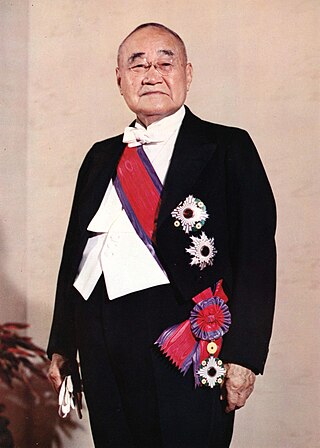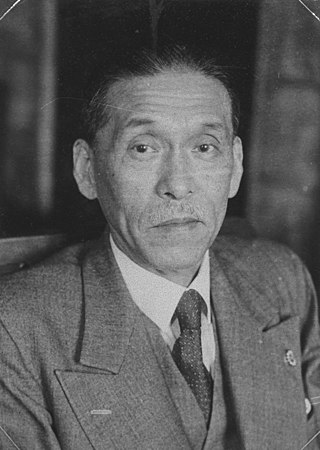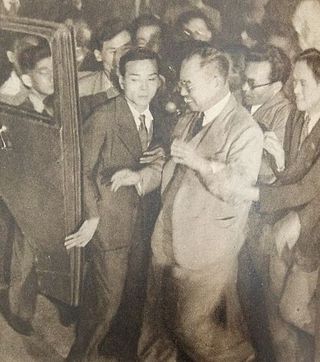
The prime minister of Japan is the head of government and the highest political position of Japan. The prime minister chairs the Cabinet of Japan and has the ability to select and dismiss its ministers of state. The prime minister also serves as the commander-in-chief of the Japan Self Defence Forces and is a sitting member of either house of the National Diet. The current prime minister is Fumio Kishida of the Liberal Democratic Party, who assumed the office on 4 October 2021.

Shigeru Yoshida was a Japanese diplomat and politician who served as Prime Minister of Japan from 1946 to 1947 and from 1948 to 1954, serving through most of the American occupation following the Pacific War. He played a significant part in determining the course for post-war Japan by forging a strong relationship with the United States and pursuing economic recovery.

Hitoshi Ashida was a Japanese politician who served as Prime Minister of Japan in 1948. He was a prominent figure in the immediate postwar political landscape, but was forced to resign his leadership responsibilities after a corruption scandal targeting two of his cabinet ministers.

Tateshina is a town located in Nagano Prefecture, Japan. As of 1 April 2019, the town had an estimated population of 7,147 in 2834 households, and a population density of 110 persons per km2. The total area of the town is 66.87 square kilometres (25.82 sq mi). Tateshina is famous for its apple orchards.
Ashida is a Japanese surname. People with the name include:

Vampire Hunter D is a 1985 Japanese fantasy horror OVA film produced by Ashi Productions, in association with Epic/Sony Records, CBS/Sony Group, and Movic. The screenplay is based on the first in the long-running series of light novels written by Hideyuki Kikuchi.
Events in the year 1948 in Japan.

Takeru Inukai was a Japanese politician and novelist active in Shōwa period Japan. Also known as "Inukai Ken", he was the third son of Prime Minister of Japan Inukai Tsuyoshi.

Ashida-shuku was the twenty-sixth of the sixty-nine stations of the Nakasendō. It is located in the present-day town of Tateshina, in the Kitasaku District of Nagano Prefecture, Japan.
Jun Ashida was a Japanese fashion designer. Born in Jeonju, Jeollabuk-do, Chosen, he began studying under illustrator Jun'ichi Nakahara. After gaining experience as a consulting designer, Ashida created his first fashion label in 1963, which would later be named after him. From 1966 to 1976, he served as the personal designer for Empress Michiko. Throughout his career, Ashida designed for royalty, sports teams, and companies. His daughter, Tae Ashida, also became a fashion designer.

General elections were held in Japan on 25 April 1947. The Japan Socialist Party won 143 of the 468 seats, making it the largest party in the House of Representatives following the election. Voter turnout was 68%. It was the last election technically held under the Meiji Constitution in preparation for the current Constitution of Japan which became effective several days later on 3 May 1947. The upper house of the Diet was also elected by the people under the new constitution, the first ordinary election of members of the House of Councillors had been held five days before.

The Ashida River is a river that flows through the eastern part of Hiroshima Prefecture, Japan. The river provides the primary drainage for the Bingo region.
Motai-shuku was a mid-station along the Nakasendō in Edo period Japan. It was in between the post stations of Mochizuki-shuku and Ashida-shuku. It is located in the present-day town of Saku, Nagano Prefecture, Japan.

Mana Ashida is a Japanese actress, talent and singer. Her first appearance was in Asahi Broadcasting Corporation's ABC Short Movie 2, though she rose to prominence after acting in the television drama Mother. She became the youngest lead star in Japanese drama history when she starred in Sayonara Bokutachi no Youchien. She was the youngest lead actress in a television serial drama by appearing in the serial drama Marumo no Okite in the spring of 2011. She also appeared in Japanese films such as Confessions and Bunny Drop.

Magic Tree House is a 2011 Japanese animated fantasy film based on the American children's book series of the same name by Mary Pope Osborne. The film is directed by Hiroshi Nishikiori, and the film's screenplay was adapted from the Japanese version of the novel series Magic Tree House by Ichiro Okouchi. The film stars actress Keiko Kitagawa as Jack, and also stars child actress Mana Ashida as Annie.

Shinsuke Ashida was a Japanese actor. He appeared in more than 90 films between 1952 and 1996.

The Katayama Cabinet governed Japan under the premiership of Tetsu Katayama from 24 May 1947 to 10 March 1948, during the Allied occupation. It was the first cabinet under the postwar constitution.
The National Cooperative Party was a centrist political party in Japan.

Rampaging Dragon of the North, also known as North Sea Dragon, is a 1966 Japanese yakuza action crime film directed by Kinji Fukasaku starring Tatsuo Umemiya and produced by Toei Tokyo.

Takeo Kurusu was a politician in Japan's Democratic Party. He served in various political and government offices, including the minister of finance in the cabinet led by Prime Minister Tetsu Katayama.
















